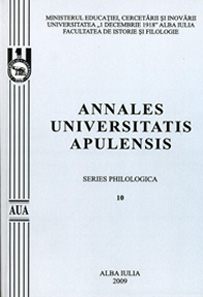CERCETAREA INTERDISCIPLINARĂ A UTOPIEI LITERARE: DE LA ACTUL RECUNOAŞTERII LA NECESITATE ŞI LIMITE
THE INTERDISCIPLINARY APPROACH OF LITERARY UTOPIA - FROM IDENTIFYING TO NECESSITY AND UP TO LIMITS
Author(s): Iuliana SavuSubject(s): Literary Texts
Published by: Universitatea »1 Decembrie 1918« Alba Iulia
Keywords: utopia; fiction; reality; literariness; interdisciplinarity
Summary/Abstract: Unlike works of unquestionable literariness, literary utopias involve a dimension which is responsible for what Peter Ruppert considers to be “the ideological effect”. Should one survey what happens between ‘emission’ and reception, (s)he acknowledges the openness towards ethical, social and political issues, the functions typical of this kind of text – to stir conscience up and stimulate reflexiveness –, its specific – namely epistemological and axiological – profitability. In short, the dialogue between aspects related to various disciplines (history, sociology, social psychology, anthropology etc.), some of them only anticipated in the XVIth century in the scholars’ preoccupations, is part of the coming to life of the utopian genre. Given the fact that literary utopia is a hybrid, a philologist’ approach to these texts may be only the main direction of a research that is necessarily an interdisciplnary one. Both the model (Thomas More’s Utopia) and the (re)configurations that follow certify the genre’s acute sensibility to the historical context and to the limits between epochs, the relationship between all these being one of influence and never of cause and effect. The critique of the present or past and the assertion of the (new) ideal are always connected to a context that is transcended. Therefore, on the one hand, to study the correspondences between history and the utopian fiction imagery is a constant temptation, and the results of such research should by no means be despised. As a matter of fact, they prove quite useful, especially since the signs of a given moment get blurred as the time goes by (we refer, for example, to Renaissance or Enlightenment utopias and even to protodystopias). On the other hand, since none of the works that illustrate a particular utopian configuration is meant to be a documentary on the epoch in which it emerges, the philologist is interested not in identifying the personalities or the social categories that serve as a model, but in their transposition and the quality of the fiction, to which formal, numerical or quantitative fidelity is no criterion. The symbols and not the people or the events are mostly to be found in the imaginary worlds. Consequently, the one who studies the (specific) literariness of utopia may not ignore its dialogue with the reality to which it is connected and with the other discourses on this one. The interdisciplinary approach is then imperative – niether optional nor some kind of noblesse oblige. To make an accurate description of the task, one may quote Corin Braga’s definition of the comparatist: a “visiting scientist in allien worlds”. Many of the advantages the author mentions are also valid: multiplication of points of view, translating of perspectives and methodologies, renewal of ideas, a bird’s eye view, familiarizing with connected domains.
Journal: Annales Universitatis Apulensis. Series Philologica
- Issue Year: 11/2010
- Issue No: 1
- Page Range: 177-185
- Page Count: 9
- Language: Romanian

